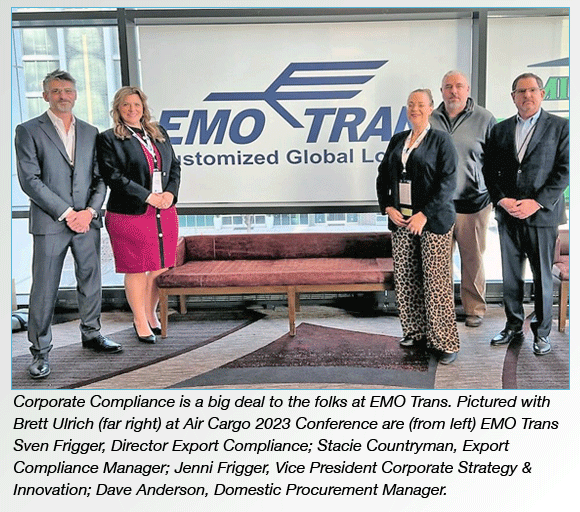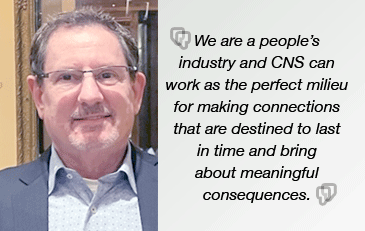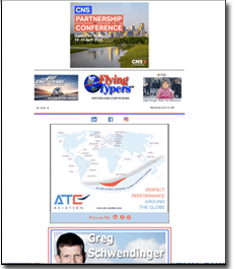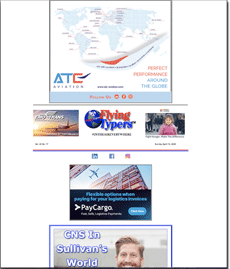Brett Ullrich is Corporate Air Procurement
Manager at EMO Trans, the historical freight forwarding and logistics enterprise
led by the late Jo Frigger, whom our readers have met in repeated occasions
in the past. Jo was a superb entrepreneur and a close friend for Geoffrey
and Sabiha Arend.
Brett Ulrich lives and works in Chicago, a
city that has been at the centre of U.S. aviation for many years. Still
among the busiest airports in the world, ORD lost the podium to other airstrips
at the end of the century. I asked Geoffrey if he could make any interesting
comments about the windy city and, as is natural for somebody who lived
in Chicago, memories kept flowing . . . and what memories!
This is what he told us: “I noted in my attempt to celebrate Chicago
that I love, went to school, am still a member of the fabulous Art Museum
that I kept visiting since I rode there in my bike when I was 12 years old.
Once in Chicago I recall lunch with my grandmother in Marshall Fields, the
great main store from the turn of the last century. Fields at one time was
purchased by Target and in its final throes became a Macy’s. It had
this very elegant ladies’ restaurant upstairs . . . Then we walked
down State Street to her job at the Palmer House, the flagship hotel of
Hilton worldwide, credited with inventing the brownie chocolate dessert
among other things.”
As it happens, making connections reveals
a reality that otherwise would remain undisclosed. The fact that Brett Ullrich
is from Chicago is not without consequences for us. We are also featuring
United’s reality in Chicago and now we are at EMO’s and the
city comes back again and again with its composite character. What would
American filmmaking be without Chicago? What about jazz? That is where Geoffrey’s
memories started erupting again: “Flossie Arend worked in reservations
and when it came time for us to move to New York she asked Conrad Hilton
himself, who always came to talk to the people, if she could transfer to
The Roosevelt near Grand Central Station in Manhattan. He said ‘sure’
and used to visit her there as well. I was walking down the street a couple
years back and saw those Palmer House Buildings and the view from a distance
shot me back 60 years.
“I love Chicago, especially The Loop
and the great Clubs of the 1930s and 40s. Many Clubs broadcast on AM Radio
nightly and because the signal from Chicago in the Midwest at the lower
end of the AM Dial (660,710,880) skipped all the way to Mexico from Chicago.
The Loop was jazz and big band mecca as well as anywhere else in USA especially
during 30s and 40s, leaving a legacy that lasts and shines to this very
day.
“From that time too early for me to be there
I got to see musicians that still hung out in that area into the 1970s and
later. Once in the 1960s I was in the Executive House and walked into the
small club two steps away for a beer and in walked Erroll Garner, the piano
legend of jazz. He sat down and played for about an hour, then got up and
walked to the bar. The bartender opened the register and took out some money
and gave to Erroll, who smiled at everyone and left – Pure Chicago.”
Turning the page on today’s Chicago,
where Brett Ulrich lives and works, we have put some questions together
for him, as we learnt he is participating in the CNS Partnership Conference
taking place right now. At EMO Trans Brett Ullrich works in the global environment
or air cargo. IATA and FIATA tried to build a global programme for many
years. We heard recently from FIATA that more work is taking place at present
with a view to reaching the agreement. In the USA CNS has been in place
for many years and in a way it has been the example which was inspiring
the ongoing talks. Many believe that a global programme would be extremely
advantageous for business globally. This is why the consequences of what
is decided at CNS may influence future developments, not only in the USA.
 |
FT: Thanks
for accepting our questions, Mr Ullrich. We read in your social media
profile that you are based in Chicago, which was once the busiest airport
in the world. Do you believe this contributed to putting aviation at the
centre of your education and career choices when you were younger? Was
the transition from aviation to logistics a natural step or a decision
looking for better opportunities?
BU: Yes,
certainly. Growing up just 5 miles from ORD, I was interested in airplanes
and aviation at an early age. There was always a lot of activity in the
sky around O’Hare and we did a lot of plane spotting as kids. As
a young kid living close to aircraft landing and taking off all day, it
was impossible to avoid looking upward to the sky . . . After
watching you want to be part of it, so there was I eventually. My education
was focussed on aviation and I managed to get my private and commercial
pilot certificate for flying aircraft – privately and I am still
flying as a hobby today. But evidently, I was not destined to become a
pilot, life goes on and many other doors open for you. I entered the area
of logistics still early in my career and then moved on through a series
of changes that involved the companies I was working for.
FT: In your
role at EMO Trans you seem to be in a position where you would have multiple
choices to make. What is the guiding principle, is it just a question
of price, or do you have particular requirements that you expect your
service providers to meet?
BU: A lot
of factors go into the decision making. Price is certainly a determining
factor, but not the primary. Most important I believe is meeting the customers’
requirements. We always try to provide the most direct economical routing
available, and this leads to choosing a service provider with proven reliability.
In my view this is the only way to meet your customers’ needs, price
matters but services in place matter most.
FT: We have
heard you are attending CNS. We are great supporters of this platform,
as we believe its influence on the level of air cargo services is significant.
We read on CNS’s website that “CNS’s primary purpose
has been, and continues to be, the development and distribution of programs
and services to all providers of air cargo to help them achieve their
respective business strategies. CNS aims to foster an environment of professionalism,
innovation and mutual respect and understanding of each other’s
challenges.”
BU: Yes,
I am attending the annual conference. It is a chance for us all to be
together for important discussions and to continue to develop relationships.
It has always been an exciting event. All in all, I have been participating
in the meetings for some twenty years in different capacities, eventually
on behalf of EMO Trans. We are a people’s industry and CNS can work
as the perfect milieu for making connections that are destined to last
in time and bring about meaningful consequences.
FT: There
are areas in the world where the following statement “today's air
cargo industry understands that we are all dependent on each other for
our success” would elicit different comments. What is your thought
in this regard?
 BU:
I do believe the statement as fact and can be taken
as is. Each of us provides a link in the chain and we are dependent on
one another for success of the air cargo industry. CNS and IATA continue
to foster collaboration and education for our industry here in the U.S.
They provide a neutral environment we can all draw from to meet our individual
goals. BU:
I do believe the statement as fact and can be taken
as is. Each of us provides a link in the chain and we are dependent on
one another for success of the air cargo industry. CNS and IATA continue
to foster collaboration and education for our industry here in the U.S.
They provide a neutral environment we can all draw from to meet our individual
goals.
FT: In closing,
we would be delighted if you could share a thought or suggestion for the
younger generation approaching logistics and air cargo in particular.
What would be your recommendation for today’s young freight forwarder?
BU: My suggestion
for the younger freight forwarders thinking about a career would be to
try and learn all aspects of the business and look for the role that suits
you best. There are many different jobs, roles and positions that make
up the air cargo industry. ‘Find one that you like and stick with
it.’
This final point is in my view extremely
important. We live in a period which is not particularly inclined to teaching
the value of perseverance. There are so many opportunities for the younger
generation, in particular in the USA and the most developed areas of the
world. We see at times young professionals suddenly veering off to pursue
a new career or a new project. This often marks a positive development
for the person, but it may pose risks that at times could be underestimated.
For companies, as we have oftentimes heard,
this is a big challenge, to the point of requiring particular strategies
to ensure continuity in staffing. In this regard I can add a personal
note: much of the success that luckily came in my career had to do with
the fact of ‘sticking with it’. Trying and experimenting with
one’s career is quite fine up to a certain point: we all did, didn’t
we? But the ability to stick to your piece and get the best out of it
is probably more important.”
This is a very good final suggestion for which
we are grateful to Brett Ullrich, our guest of the day.
Let us close this interview with a note from
our guest about his city and workplace: “Chicago is a great place
to work and live with ORD still being one of the busiest airports in the
world with one of the best cargo communities in the country. I look forward
to catching up with my friends and colleagues from the Midwest and across
the country at the CNS conference in DFW.”
We have unintentionally built a special
number on Chicago. It came about as a sort of serendipity exercise. When
Sabiha and Geoffrey asked me to reflect on the events that were leading
to CNS, and to take contact with those in charge, Chicago coalesced on
my screen as though coming with the wind . . . The wind
of Chicago, the sudden, gusty zephyr you feel at the base of the tall,
solid buildings of the city, which “compels you to put your hand
to your hat” that would be otherwise blustered in all directions
by the Aeolian deities of the air.
All came with the wind and all travelled
by air, this time to DFW!
Marco L. Sorgetti
|





